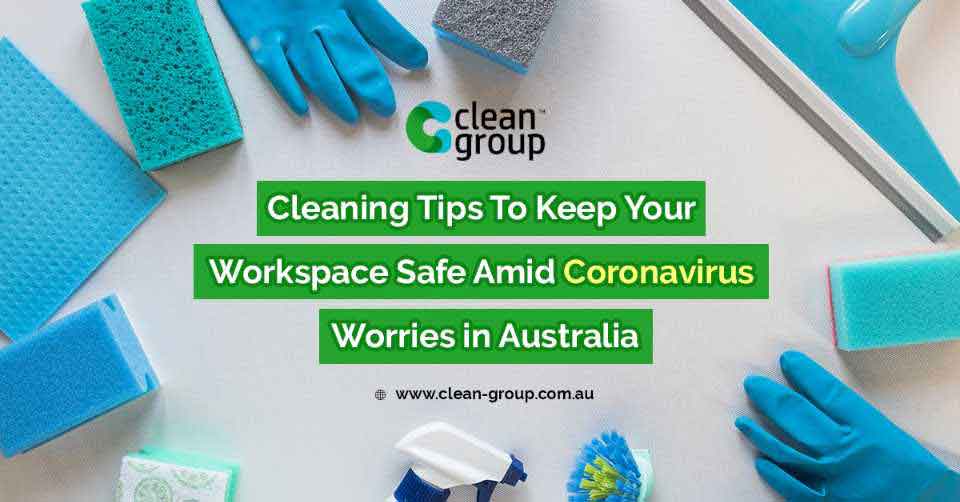By now, you have probably heard about Covid-19 or CoronaVirus disease discovered in 2019, which is responsible for a global pandemic. Thus far, the main country affected has been China, but it has spread to many countries around the world to a varying degree. Clean Group Professionals with its COVID Cleaning in Sydney and across Australia will do their best to provide you with clean and sanitize workspaces.
The virus is initially referred to as the 2019-Nov or the 2019 Novel CoronaVirus and was informally called, “the Wuhan CoronaVirus”. The World Health Organization named the disease COVID-19 because it does not refer to a geographical location, an animal, a person or a group of people. All of which can lead to stigma. They also want to make it pronounceable and related to the disease, which is not an easy task.
With this virus going pandemic, we are with you in your campaign of keeping a safe and healthy place for your employees and customers. We can isolate Australia from being affected by this virus.
As we did our research while writing this article, we learned that Australia has 112 confirmed cases of CoronaVirus, including 3 deaths. According to the Australian Government Department of Health, here are the statistics:
- New South Wales: 60
- Queensland: 15
- South Australia: 6
- Tasmania: 2
- Victoria: 15
- Western Australia: 4
- 10 people are associated with the Diamond Princess cruise ship.
Trade and businesses all over the country cannot stop their operation as the economy also depends on them. These businesses have the sole responsibility for keeping their employees safe.
With that being said, commercial cleaning plays an essential role. As a business owner, it is time for you to sit down and talk to your local cleaning provider and find out what they do to make sure that your office is still a safe place.
Cleaning Steps for Open Workspaces
We cannot deny the fact that CoronaVirus cases are significantly increasing. Working in a clean environment is a sure way to protect yourself from getting the virus or getting sick while at work. Office cleaners observe these 12 steps and guidelines during the period of Coronavirus outbreak.
- Wear face masks and gloves while cleaning. Do not touch the face further.
- Prepare the cleaning solution by mixing water and bleach according to the manufacturer’s instructions.
- Open the windows if you can.
- Mop the floor with your cleaning solution from one end to the other
- Soak wiping cloths in a separate cleaning solution. Use this to wipe all frequently touched areas and toilet surfaces.
- Repeat mopping as before.
- Put all used wiping cloths and other waste into double-lined plastic bags or trash bags.
- Remove the used gloves and wash your hands with soap and running water.
- Remove the used mask and wash your hands with soap and running water.
- Put the used mask and gloves into double-lined plastic bags or trash bags.
- Separate plastic or trash bags generated from the clean-up from other rubbish and throw them away as regular rubbish as soon as possible.
- Shower and change clothes immediately.
Desk Cleaning
The desks should be wiped down at least once per week, but your office cleaner needs to check if they need attention to every cleaning schedule. He should be looking for fingerprints, dust, and filth. There should never be dust bunnies on desks or counters.
Other surfaces require daily wiping like customer counters. Most of the time, your cleaner will not move items on the desks, but if dust and dirt are building up, he or she must move them. The cleaners are advised to move items carefully.
There are two ways to wipe down surfaces. The first one is using the damp cloth method and spraying as you go. Most of the time, spraying as you go is the preferred method. You can control the amount of cleaning solution being used and reduce the chances of streaking.
Cleaners are also responsible for dusting all surfaces, which can include computers, computer screens, printers, file cabinets, and the top of the dividers.
Always keep your eyes open for dust while doing this task. Use a duster to reach areas that you cannot reach with a rag. Make sure to clean up any piles of dust after dusting if needed.
When dusting desks, be very careful around breakable objects. Make sure to get behind the computers and computer screens. Dusting a desk with a duster may not be necessary if you dust it with a rag when you wipe it down. Dusting should be performed at least once a week.
Cleaning Your Laptop
Your laptop is one of the dirtiest electronics in your office. According to some reports, laptops, specifically, keyboards have more germs on them than toilet seats.
For this job, you will need microfibre cloths, mild soap, and distilled water. These are the only components that you should use for your laptop screens since alcohol or other solutions can damage the finish. We are using distilled water because it does not leave streaks behind. We also need compressed air and rubbing alcohol for the keyboard.
Do’s and Don’t for Cleaning the Laptop
- Shut down the laptop entirely and be sure to unplug everything from all the ports before you get to cleaning.
- Do not spray any liquids directly on your computer. Spray the cloth away from your device and then clean it.
- Read the user’s manual. There are care instructions written there.
- Do not remove your laptop keys unless you are sure of what you are doing.
- Make sure to clean your fan vent if your laptop has one. This can get clogged over time because they suck in air that has dust which can eventually affect the performance of the fan.
Steps in Cleaning
- Start with making a solution of one cup of distilled water and a drop of dish soap.
- Dip the cloth into the solution and wring it out until damp and wring it out. Please use an as little amount of water as possible.
- Use the cloth to clean the outer case of the laptop, making sure not to get any moisture in the openings.
- Find a dry spot on the cloth and buff it dry.
- Start with blasting out as many crumbs as possible using compressed air in cleaning the keyboard. You can also use rubbing alcohol. Lightly dampen the cloth with the alcohol and carefully wipe the keys remembering to get the sides.
- Find a dry spot on the cloth and buff all the keys dry.
- Use the same cleaning solution to clean the track or mouse pad.
- For the screen, all you need is a lint-free microfibre cloth, and that is it.
CoVid19 Facts
Corona Viruses that circulate among humans are typically benign, and they had caused almost a quarter of all common cold illnesses.
Occasionally, Corona Viruses that circulate in an animal reservoir mutate enough to where they can start infecting and causing diseases in humans if they are given an opportunity.
In 2002, SARS was a Corona Virus that hopped over from bats to civets, and then over the humans.
In 2012, there was MERS that hopped over from bats to camels before infecting humans.
CoVid 19, most likely, started with bats, but this time, the intermediate host was probably a pangolin. That was based on the fact that scientists identify a CoronaVirus in pangolins that says 96% genetic match so CoVid 19.
As of February 11, 2020, there are 43,103 cases of CoVid 19 with 1,018 deaths which gives the fatality rate to 2.4% according to the World Health Organization. A vast death case had occurred in China.
How CoVid 19 Infects People?
The virus has spikes that allow the virus to invade cells lining the respiratory tract and lungs. After binding, the Corona Virus enters and takes over the cellular machinery to make more and more copies of itself so it can spread over the surrounding cells and get into the mucous.
Sometimes, the infection is mild, and some people do not develop any symptoms at all. For others, they can create symptoms that can range from fever, cough, and shortness of breath, all the way to severe problems like pneumonia.
Severe lung damage can cause Acute Respiratory Distress Syndrome, which occurs when the lung inflammation becomes so severe that fluid builds up around and within the lungs.
Severe infection can cause septic shock, which happens when the blood pressure falls dramatically, and the organs starve for oxygen. ARDS and shock are the most common reasons for death in people infected by the virus.
How Does the Virus Spread?
Corona Viruses can spread quickly. Usually, the virus spreads when people cough or sneeze, and tiny droplets containing the virus are released. These droplets can land on another person’s mouth, nose, or eyes. That allows the virus to enter a new person.
The virus can also be found in a person’s stool, and in a rare situation, Corona Virus has been transmitted from one apartment to another within a residential building.
Once a person is infected, symptoms develop an average of 5 days later. This is called the incubation period. However, the incubation period varies from person to person, and in some studies, it has lasted as long as 24 days.
Treatment
Treatment is focused on supportive care. Providing fluids, oxygen, and ventilatory support for ill people are examples of supportive care.
Prevention
Unfortunately, there is no vaccine currently available to protect against CoVid 19.
For now, the goal is to avoid human-to-human transmission, starting with isolating people with Covid-19. CoronaVirus does not usually spread over long distances in the air. Still, they can travel roughly 3 feet or 1 meter from one person to another on tiny droplets of saliva which are produced when someone is coughing or sneezing. Also, some strains of Coronavirus can survive on surfaces for over a day.
With that in mind, if you are a healthy person living in a non-outbreak area, the recommendation is to avoid travelling to disease outbreak areas. Stay away from crowded places and stay at least 6 feet or 2 metres away from anyone with symptoms.
Wearing a surgical mask is not recommended, because the general risk of getting CoVid 19 in this setting is so low. As always, careful handwashing is the key. It should be done with soap or alcohol-based hand sanitisers.
Avoid touching your eyes, nose, and mouth. This area is known as your T-zone and is the common entry point for viruses into the body.
In a situation like this, we need to be vigilant with our surroundings. Always put cleanliness and sanitation as your top priority. Your office cleaner will know what to do and what are cleaning chemicals needed to fight these viruses that can harm your health. Write your comments below and join us with our campaign against Covid 19. Let us spread awareness and stay safe at all times.
Do you need more information on COVID-19 Cleaning? Read our guide on COVID-19 cleaning.

